World Humanitarian Day: story from the field
19 August 2021 – World Humanitarian Day recognizes aid workers who put their lives on the line to help others, particularly during times of crisis. At the World Health Organization (WHO) country office in Somalia, humanitarian workers conduct their duties without hesitating, standing tall in the face of all kinds of challenges to support the Federal and State Government to ensure every last person can access health care.
This year, World Humanitarian Day is highlighting the immediate human cost of the climate crisis and raising awareness for leaders to take meaningful climate action for the world’s most vulnerable people.
Humanitarians working behind the scenes
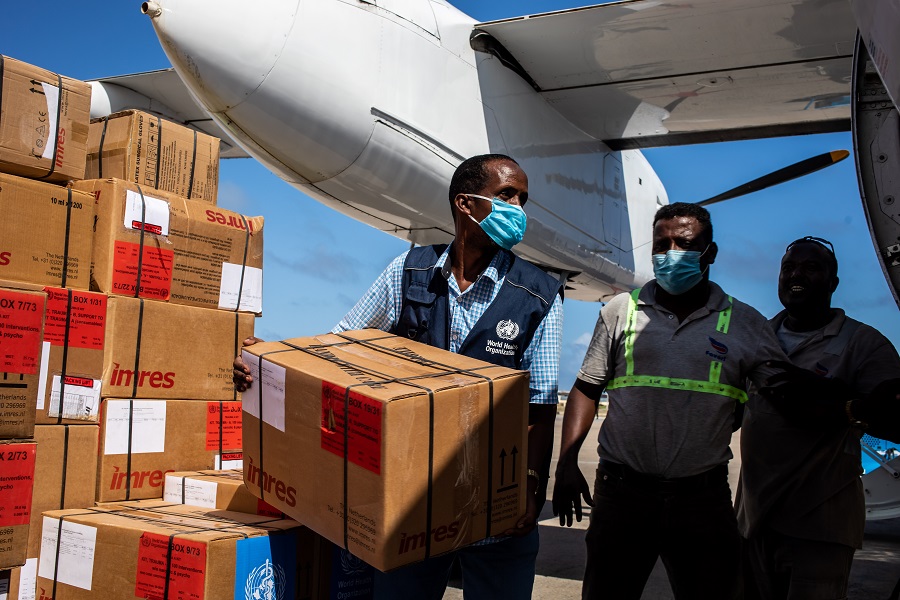
In Somalia, climate changes have exacerbated a string of events – including recurrent floods, drought and cyclones, which in turn breed waterborne and vector-borne diseases and limit access to regular health services.
The timely and adequate response to prevent these diseases requires the pre-positioning of emergency medical supplies and other equipment in anticipation of any public health event that may constitute an outbreak.
Forty-six-year-old Hussein Hersi Shire has an important role at WHO related to this part of the emergency health response. Like a link in a chain, he coordinates the delivery and arrival of life-saving medical supplies into Mogadishu from various countries, storage at the WHO warehouse and then he coordinates with other warehouse colleagues to ensure supplies and equipment are distributed further to the states and communities in need.
Climbing the ranks with his dedication
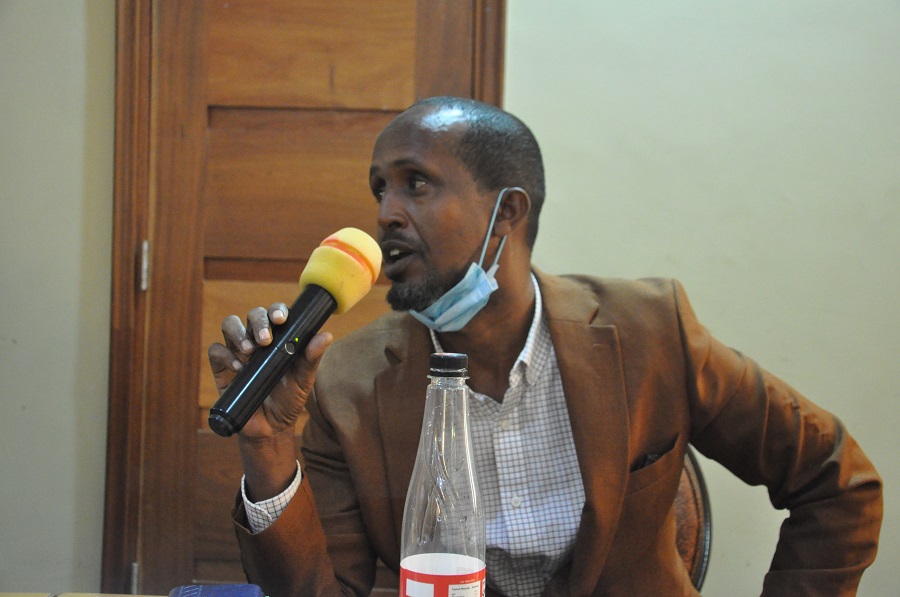
Hersi is a popular humanitarian worker at WHO, as his colleagues recently nominated him for being a star performer of the year for his dedication, commitment and outstanding service to the Organization. A lean, modest man with an unassuming smile, he leads this humanitarian work of the Organization from behind the scenes. Starting his career as a guard at WHO in 1996, he climbed the ranks over the years and now serves as a logistics assistant based at the main WHO warehouse in Mogadishu.
Hersi believes he was able to advance his career by being honest, hard working, respecting other colleagues with different cultural backgrounds and maintaining his vision towards his goal.
A father of four Hersi makes a special mention of the support he has received from the WHO country office team, particularly the current Representative to WHO Somalia, Dr Mamunur Malik, whom he credits for giving WHO employees the opportunity to be part of life-saving activities, while motivating them in various ways.
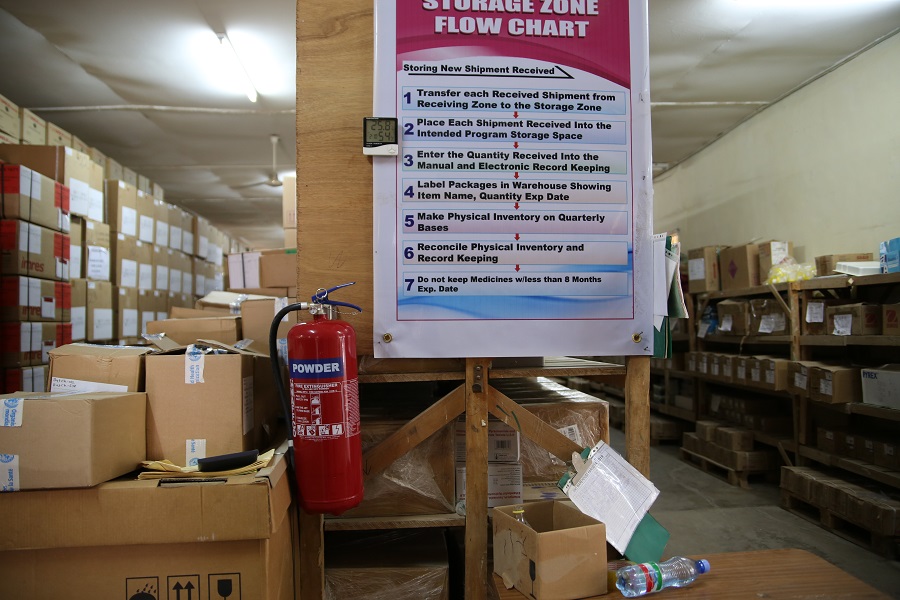 Explaining what humanitarian work means to him, Hersi has a glow in his eyes as he responds, “Since the security situation of Somalia is unpredictable, every morning before I leave to go to work, I have to assess the security of the road between my home and working premises. But work is important for me. Being a humanitarian worker entails helping communities and identifying their needs and the challenges they face. As we contribute in different ways, I feel as I support to deliver life-saving supplies, I am contributing to creating sustainable answers for real change.”
Explaining what humanitarian work means to him, Hersi has a glow in his eyes as he responds, “Since the security situation of Somalia is unpredictable, every morning before I leave to go to work, I have to assess the security of the road between my home and working premises. But work is important for me. Being a humanitarian worker entails helping communities and identifying their needs and the challenges they face. As we contribute in different ways, I feel as I support to deliver life-saving supplies, I am contributing to creating sustainable answers for real change.”
Race against time to boost COVID-19 vaccine uptake in Somalia
Somalia receives 302 400 Johnson & Johnson single-shot vaccines to protect more Somalis from COVID-19
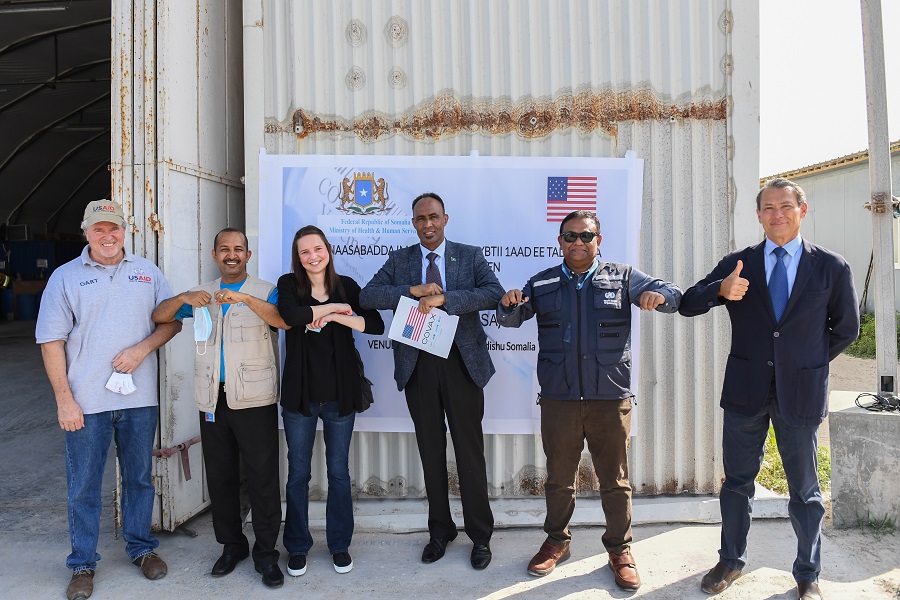 High-level representatives from the Federal Ministry of Health and Human Services, the Embassy of the United States of America (USA), World Health Organization (WHO), United Nations Assistance Mission (UNSOM) and United Nations Children’s Fund (UNICEF) in Somalia receive the Johnson & Johnson vaccines donated by the Government of USA through the COVAX Facility on 12 August at the Aden Adde International Airport, Mogadishu. Credit: Mukhtar Nuur, UNSOM
High-level representatives from the Federal Ministry of Health and Human Services, the Embassy of the United States of America (USA), World Health Organization (WHO), United Nations Assistance Mission (UNSOM) and United Nations Children’s Fund (UNICEF) in Somalia receive the Johnson & Johnson vaccines donated by the Government of USA through the COVAX Facility on 12 August at the Aden Adde International Airport, Mogadishu. Credit: Mukhtar Nuur, UNSOM
17 August 2021 – While Somalia witnesses yet another spike in coronavirus disease 2019 (COVID-19) cases, on 12 August 2021, the Federal Government of Somalia received a consignment of 302 400 doses of Johnson & Johnson single-shot vaccines, donated by the United States of America through the COVAX Facility. The COVAX Facility is co-led by the Coalition for Epidemic Preparedness Innovations (CEPI), Gavi, the Vaccine Alliance, and the World Health Organization (WHO), alongside the United Nations Children’s Fund (UNICEF).
WHO is providing technical support to the federal and state ministries of health for the successful roll out of COVID-19 vaccines across the country along with its key partners, notably UNICEF.
“In this tight race against time, we are working with the Government of Somalia to bring this vaccination programme against COVID-19 to a speed and scale so that most of the high-risk populations are vaccinated,” said Dr Mamunur Rahman Malik, WHO Representative to Somalia. “We cannot emphasize enough how important it is to ensure vaccines reach all populations equitably, though, no matter where they live. It is only with support from donors such as the Government of the United States of America that will we be able to reach all eligible people, particularly vulnerable populations and those living in difficult-to-reach locations.”
WHO works closely with partners such as UNICEF for the safe storage of vaccines and community engagement, and the World Food Programme (WFP) for the delivery of vaccines and other life-saving equipment to far-flung areas which remain largely inaccessible by road.
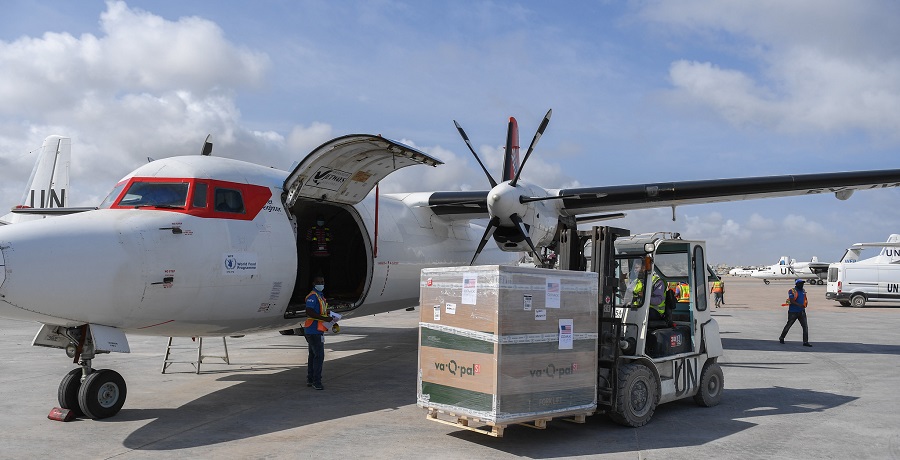 The Johnson & Johnson vaccines have been donated by the Government of the United States of America, through the COVAX Facility, which is working to create more equity in vaccine delivery across the world. Mogadishu, August. Credit: Mukhtar Nuur, UNSOM
The Johnson & Johnson vaccines have been donated by the Government of the United States of America, through the COVAX Facility, which is working to create more equity in vaccine delivery across the world. Mogadishu, August. Credit: Mukhtar Nuur, UNSOM
Current status
Since the start of the COVID-19 outbreak, 16 103 laboratory-confirmed cases, including 864 deaths, have been reported in Somalia. So far, the COVID-19 vaccination uptake among the general population remains low. Less than 1% of the population in the country have so far been fully vaccinated in Somalia: as of 16 August 2021, only 93 516 Somalis have been fully vaccinated against COVID-19 and 187 578 people have received their first dose. This low uptake resulted partly from the unpredictable supply of vaccines in Somalia and partly from the fact that agencies like WHO and UNICEF have faced financial constraints to support the operational cost for the roll out of vaccines. As the supply situations improve and many donors, including GAVI, the Vaccine Alliance, have pledged funding for the operational cost, the situation looks promising for improving the uptake of vaccines.
With the arrival of these single-shot vaccines, the Federal Government, with support from WHO, UNICEF and other partners, will organize both fixed and outreach posts to vaccinate more high-risk people. Another strategy which the Government is contemplating with these single-shot vaccines is to cover the nomads and internally displaced population. Approximately 26% of the country’s population who are nomadic and an estimated 2.6 million people who are internally displaced in the country can benefit from this vaccination campaign, which is expected to kick off in the coming days.
Additionally, considering that 75% of its population is under 30 years of age, the recent decision of the Government to include all Somalis aged above 18 years in the COVID-19 vaccination programme is also expected to increase the uptake using these newly arrived single-shot vaccines.
Use of digital innovations for immunization
From the onset of the arrival of the first batch of COVID-19 vaccines, with support from WHO, Somalia has used a mobile telephone-based electronic registration system to register people being vaccinated. Known as CommCare, and first developed by the software company Dimagi, this system has enabled frontline health workers who manage vaccination posts to be efficient and effective in capturing essential information about vaccines.
108 000 doses of COVID-19 vaccines donated by France arrive in Somalia
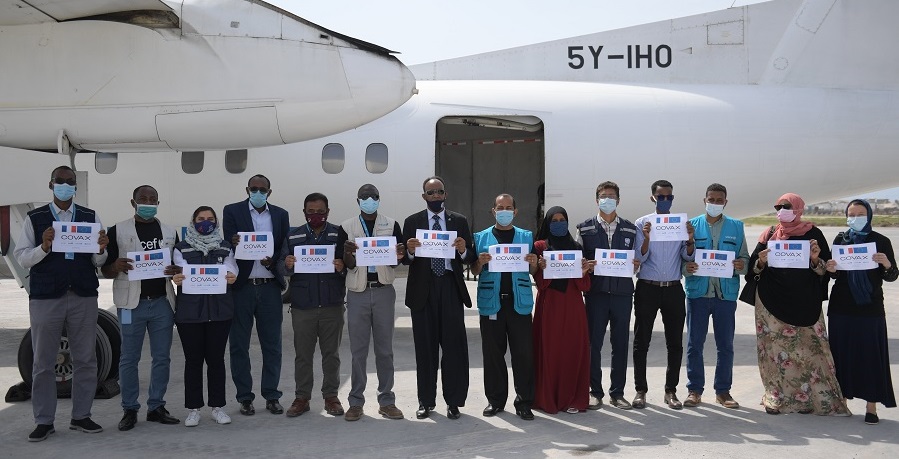
Mogadishu, 9 August 2021 – Yesterday, 108 000 doses of the Oxford/AstraZeneca COVID-19 vaccine arrived in Somalia. The vaccines were donated by the Government of France through the COVAX Facility, a partnership between the Coalition for Epidemic Preparedness Innovations (CEPI), Gavi - the Vaccine Alliance, the United Nations Children’s Fund (UNICEF) and the World Health Organization (WHO), in continued efforts to protect Somalia’s population from COVID-19.
“The Government of France is committed, along with the EU and COVAX partners, to help Somalia bolster vaccination efforts so that additional frontline workers and other high-risk populations in Somalia can be protected from COVID-19,” said Aline Kuster-Menager, the French Ambassador to Somalia. “This donation is part of a global effort from France: President Macron has pledged to give 60 million doses of the vaccine before the end of 2021. This is a global pandemic and France is committed to ensuring the equitable distribution of the COVID-19 vaccine around the world. If we are to contain the spread of COVID-19, we have to work together.”
Since the outbreak began in March 2020, Somalia has reported a total of 15 735 laboratory-confirmed cases of COVID-19, including 837 deaths as of 24 July 2021. Owing to low vaccination coverage in the country where less than 1.8% of the country’s population are fully vaccinated, the country faces the dual challenge of improving the uptake among its general population, as well as ensuring an equitable and predictable supply of COVID-19 vaccines to support an effective rollout of mass vaccination.
“The arrival of this new batch of COVID-19 vaccines comes at a critical time, as cases in Somalia are on the rise,” said HE Dr Fawziya Abikar Nur, Somalia’s Federal Minister of Health and Human Services. “The only way to stop the spread of the virus is to get the population vaccinated. We are grateful for this latest donation from the Government of France and I call on all those eligible to get vaccinated.”
Somalia will continue to prioritize frontline health and other essential workers, the elderly, and people with chronic health conditions in this next phase of the roll out of the COVID-19 vaccine. To date, an estimated 186 094 people in Somalia have received their first dose of the vaccine and 92 792 have received their second.
“We appreciate the commitment of the French Government to ensure the equitable delivery of COVID-19 vaccines by providing much needed doses to Somalia,” said Mohamed Ayoya, UNICEF Somalia Representative. “This timely support will be critical in increasing the number of people vaccinated against COVID-19, particularly the health workers so they can continue to provide essential health care for Somali children and their families.”
WHO and UNICEF will continue to support the Ministry of Health to ensure the safe and equitable distribution of the vaccines through the management of cold chain systems and in the training of vaccinators and the monitoring of vaccine utilization. Efforts will also continue to promote the safety and uptake of the COVID-19 vaccine.
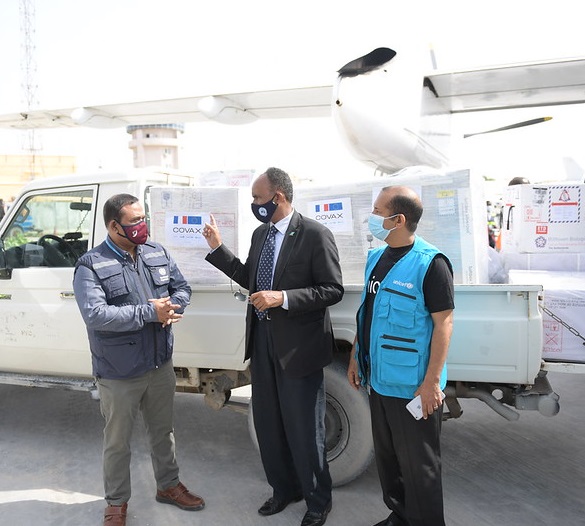 “If we can end the pandemic in Somalia, we can end it everywhere. The country’s fragile health system, high number of its population, especially high-risk people, still to be vaccinated can make the virus more transmissible and we risk emergence of a new variant of the virus in the country if we cannot roll out the vaccination programme against COVID-19 with speed and scale. The vaccines against the COVID-19 are remarkably safe and effective. These are our only hopes to end the pandemic from Somalia and elsewhere,” said Dr Mamunur Rahman Malik, WHO Representative to Somalia. “We remain thankful to the Government of France for their kind support in providing these vaccines for the people of Somalia.”
“If we can end the pandemic in Somalia, we can end it everywhere. The country’s fragile health system, high number of its population, especially high-risk people, still to be vaccinated can make the virus more transmissible and we risk emergence of a new variant of the virus in the country if we cannot roll out the vaccination programme against COVID-19 with speed and scale. The vaccines against the COVID-19 are remarkably safe and effective. These are our only hopes to end the pandemic from Somalia and elsewhere,” said Dr Mamunur Rahman Malik, WHO Representative to Somalia. “We remain thankful to the Government of France for their kind support in providing these vaccines for the people of Somalia.”
Related link
For additional information, kindly contact:
Khadar Hussein Mohamud
Head of Coordination and Communication
Federal Ministry of Health
+252615602637
Mukhtar A Shube
FMoH EPI Manager
Federal Ministry of Health
+252615602637
Larry Asego
Press and Communications Counsellor
French Embassy
+254 722 255 422
Fouzia Bano
WHO Chief of Staff ai, Communications Officer
+252 619 235 880
Eva Hinds
UNICEF Communication Manager
+252 613 642 635
Somali Government, UNICEF and WHO mark World Breastfeeding Week with a call to protect, promote and support breastfeeding
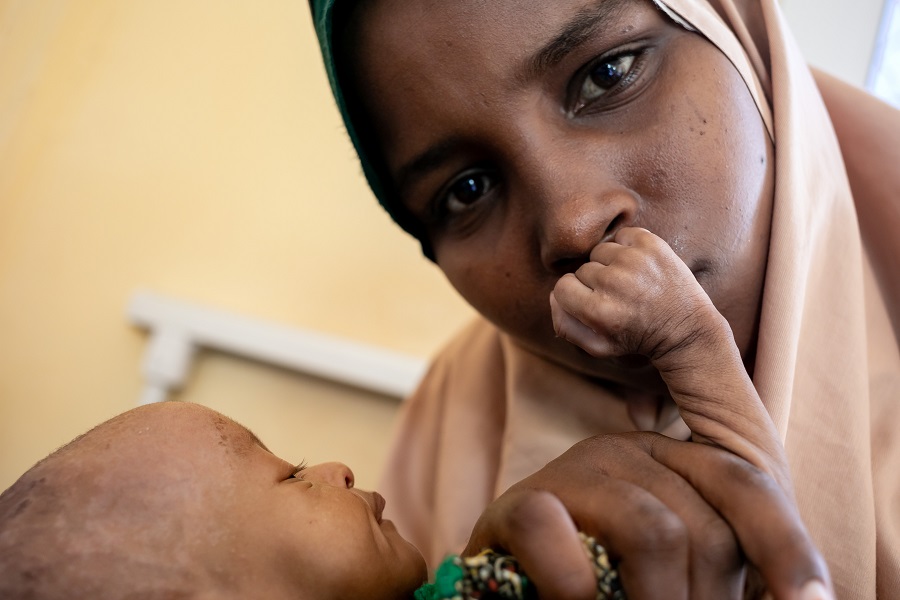 Photo: WHO/Ismael Taxta
Photo: WHO/Ismael Taxta
Mogadishu, 3 August 2021 – While marking World Breastfeeding Week this year, the Federal Ministry of Health in Somalia, the United Nations Children’s Fund (UNICEF) and World Health Organization (WHO) called for a concerted effort to create an enabling environment for Somali mothers to breastfeed their babies to improve their health, nutritional status and overall well-eing.
“We are calling on all actors from household level through community leadership up to policy-makers and development partners to actively take breastfeeding as everyone’s responsibility,” said Dr Abdinasir Mukhtar Ibrahim, the Director General, Somalia’s Federal Minister of Health and Human Services. “Together, through commitment, concerted action and collaboration, we can build strong collaborative systems for provision of appropriate and skilled breastfeeding counselling to mothers and ensure that our children are fed in the appropriate way for a healthy nation.”
This call to action comes as Somalia witnesses an increase in child malnutrition, including reduction in infant and young child feeding practices, due to steep declines in household incomes among other challenges posed by shocks such as drought, flooding and the COVID-19 pandemic. The advice is also in line with the global theme for the week: ‘Protect Breastfeeding: A Shared Responsibility.’
The Federal Ministry of Health, WHO and UNICEF recommend early initiation of breastfeeding within the first hour of birth, feeding the child only breast milk for the first 6 months (exclusive breastfeeding), and continuing to breastfeed for up to 24 months or beyond, with the introduction of nutritionally adequate and safe complementary (solid) foods at 6 months.
“Breastfeeding provides children the best start in life,” said Nejmudin Bilal, Acting UNICEF Representative in Somalia. “It is a baby’s best source of nutrition, bolstering brain development with lifelong benefits. Early initiation of breastfeeding offers a powerful line of defense against all forms of childhood malnutrition including wasting.”
During World Breastfeeding Week, the Federal Ministry of Health will launch breastfeeding awareness campaigns throughout the country and skilled breastfeeding counselling will be provided in a variety of settings, including health facilities and clinics and through home visits by community health workers. The campaign will also stress that it is still safe to breastfeed during the COVID-19 pandemic.
“Even in the context of COVID-19, WHO recommends that mothers with suspected or confirmed COVID-19 should be encouraged to initiate and continue breastfeeding, while implementing appropriate hygiene measures, such as wearing a medical mask, if available, to reduce the chances of droplets with COVID-19 being spread to her infant. The benefits of breastfeeding substantially outweigh the potential risks of COVID-19 transmission,” said Dr Mamunur Malik, WHO Representative to Somalia. “So far, active COVID-19 (virus that can cause infection) has not been detected in breast milk of any mother with confirmed/suspected COVID-19.”
In addition, as part of the Federal Ministry of Health’s national nutrition strategy 2020-2025, countrywide efforts will be scaled up with the primary goal to increase the number of babies aged 0-6 months old who are exclusively breastfed to above 50% by 2025. According to the latest government data, only 34% of babies under 6 months are exclusive breastfeeding.
World Breastfeeding Week in Somalia will focus on how breastfeeding contributes to the survival, health and well-being of all, and the imperative to protect breastfeeding worldwide. The 2021 theme is: Protect Breastfeeding: A Shared Responsibility and it is aligned with thematic area 2 of the World Breast Feeding Week/SDGs 2030 campaign which highlights the links between breastfeeding and survival, health and well-being of women, children and nations.
Improving breastfeeding rates and practices requires action on the part of multiple actors including governments, health care institutions, health care workers and businesses. During the COVID-19 pandemic, the Federal Ministry of Health will continue to ensure that access to these essential services is not disrupted and that families continue to receive the breastfeeding counselling they need.
The importance of breastfeeding is mentioned in the Holy Quran 233rd verse of Sura Al-Baqarah in which it is stated that: "mothers [should] breastfeed their children for a total of two years”.
“Breastfeeding must be considered a public health issue that requires supportive interventions at all levels. Together, we can ensure that every mother has access to skilled breastfeeding counselling, empowering her to give her baby the best possible start in life,” added the Director General.
Note to editors
In 2018, a World Health Assembly resolution endorsed World Breastfeeding Week as an important breastfeeding promotion strategy.
- The theme for World Breastfeeding Week in 2021 is aligned with thematic area 2 of the WBW-SDG 2030 campaign which highlights the links between breastfeeding and survival, health and well-being of women, children and nations.
- The Federal Minister of Health and Human Services, UNICEF and partners will continue advocating for signing and full implementation of the International Code of Marketing of Breastmilk Substitutes and subsequent WHA resolutions (the Code).
For additional information, kindly contact:
Fouzia Bano
WHO Chief of Staff ai,
Communications Officer
+252 619 235 880
Eva Hinds
UNICEF Communication Manager
+252 613 642 635
Khadar Hussein Mohamud
The Federal Ministry of Health Head Coordination and Communication
+252615602637


